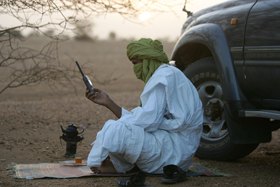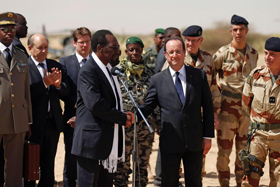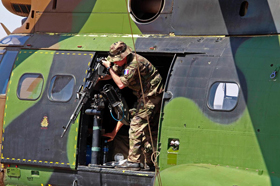After the Mali situation became aggravated, quite a number of researchers focused on the conflict's geopolitical and ethnic aspects, whereas the military side was largely neglected. However, the French operation offers a significant example of the European Union's self-sustained armed interference in Third World political processes.
In 2003 the EU executed a peacemaking mission in Congo, and it is still involved in Afghanistan. Both operations are widely believed to be failures, putting the ability of West European countries to act on an independent military policy in absence of support from the U.S.A., NATO's "driving engine", into question. Executed by French armed forces with limited outside assistance, the Mali operation presents an exception.
Changes in Azawad
In the past decade, the situation in Azawad, the north of Mali, has been constantly unstable due to the separatist efforts of the local Tuareg, who have staged incessant uprisings. The war in Libya aggravated matters by triggering a Tuareg stampede into West Africa, bringing arms looted from Libyan military depots.
In 2012, the separatist movement escalated, while the Bamako troops were increasingly unable to resist the rebels effectively. By springtime, the government forces losses by battle and desertion exceeded 1,000 men, with the total strength under 8,000. The rebellious Tuareg seized key northern cities, including Gao and Timbuktu.
In the middle of 2012, Azawad underwent major changes, as the relatively secular National Movement for Liberation of Azawad (NMLA) lost control to the radically Islamist Ansar Dine, known to be associated with al Qaeda. The radicals ousted the NMLA to the border areas and became Azawad's key military force of 10,000-12,000 combatants.
Ansar Dine is working to establish its own regime in northern Mali, one quite similar to that in Afghanistan under Taliban rule, including a ban on music, severance of limbs for punishment, and fundamentally different rules for living. They use Sharia law in legal proceedings, which are held in Arabic, a language unknown to the greater part of Azawad population.
The Bamako Offensive
By January 2013, the situation was critical, as the Azawad Islamists launched an offensive on Mali southern areas, threatening to completely break up the country and capture the non-Azawad territories for their incorporation into the future "emirate". The attack force consisted of two 1200-men strong mechanized columns, which managed to seize several cities, including Diabali and Konu. According to the media, terrorist groups infiltrated the cities on passenger vehicles before the main forces attacked, in order to throw the government troops into chaos.
The Mali crisis obviously posed a threat to economic geopolitical interests of France, which made Paris send their military contingent to support the government. No doubt, the turmoil was to a large extent a result of NATO's aggression against Libya, supported by Nicolas Sarcozy, but regardless, this January the French were faced with a fact of life.
The addition of up to 5,000 troops with air support radically changed the balance of power in favor of Bamako, and turned the entire tide of war. Several African states also planned to participate, as well as Great Britain and Germany, who announced their readiness to interfere in the midst of the January events. However, it was France that played the key role in defeating the rebels.
The French Blitzkrieg
France sent aircraft, marines and paratroopers to Mali, most of them with vast African experience.
The first battle took place at Konu, where the Mali forces were attempting to liberate the city. French aviation – Mirage jets and Gazelle helicopters – was key to the battle. Two choppers were shot down by rebels, with one pilot killed. Total casualties amounted to over 100, most of them insurgents. According to unconfirmed reports, French paratroopers also took part in the land operation.
As the next step, the French air force bombed the terrorists' depots and training camps in Timbuktu and around Gao. Strike precision was secured largely by NATO satellite and air surveillance.
The Islamists were crushed. Their troops retreated from major cities, while the advancing French-Malian coalition was taking them practically barehanded. By late January most of Azawad was free, with the city of Kidal to fall last, as reported by the NMLA, which attempted to join the victors. However, control of Azawad belonged to the French and Mali government forces.
What Next?
After the French incursion, the active phase of the war was soon finished., This is not to say that the Islamists were utterly defeated. Apparently employing practices from Afghanistan, they drew their mobile groups away from the coming French strike to prepare for guerilla war. According to some reports, their clandestine bases are already operating in the vicinity of Kidal. Although the insurgents’ strength is unknown, the remaining Ansar Dine forces are assessed at a minimum 1,000 militants ready for guerilla attacks against Malian and French troops.
In February, the rebels made a series of terrorist attacks in the Gao area. There are reports from other regions about mine attacks on military vehicles, which some observers are calling the beginning of a mine war.
The Mali authorities are preparing for the guerilla war to the extent of their ability, attempting to prevent the dispersion of combatants throughout the country through patrolling potential rebel routes and opening phone hotlines for local residents.
It is quite possible that Bamako will try to use the war and the terrorist threat as a pretext for suppression of the separatist movement in the North. In the course of the operations, the official media treated the Ansar Dine and the NMLA as allied, whereas the NMLA declared its support for the French incursion early in the war. Dangerous trends emerged at the grass roots level, with reports coming of spontaneous reprisals against the Tuareg and Arabs with participation of both the military and local residents.
A repeat of the tragic events in Rwanda does not seem likely, but the humanitarian situation in the wake of the battles cannot but instill anxiety. The Afghanistan experience suggests that mass repressions on the part of the victors, and ethnic persecution, give rise to guerilla outbursts against the authorities and their foreign allies.
Intermediate Success
Thus, the Mali operation seems to have disproved the established belief that European armies are not effective. Despite lower defense budgets and the poor morale of many European contingents in Afghanistan, the Azawad operation has proven the EU countries' capacity for war when their traditional zones of interest are under threat.
Prompt transfers of troops and equipment to the conflict zone, skilful logistics, minimized losses, and efficient air attacks used to swiftly destroy the terrorists' infrastructure do make for a spectacular demonstration of French military power.
Significantly, France has largely imitated the NATO strategy in Afghanistan and Libya, where the foreign military focused on air support of their land-based allies, interacting with them via Special Forces units attached to the non-NATO ground troops, with the battle of Konu being an exception.
The war is by no means over, as recognized by French President François Hollande during his visit to Bamako, where he assured the Malians that France would stay "until the Africans are ready to replace it." Apart from military assistance, the French are likely to invest in Azawad to improve the socio-economic situation. It is worth noting that the province is rich in potentially lucrative deposits of uranium, phosphorus, molybdenum, copper and silver.
The Azawad success, as well as the victory in Libya, seemingly points to the buildup of European activities in Africa, possibly in imitation of U.S. approaches to South America, its traditional zone of influence.
At the same time, the guerilla phase of the war on terrorism is evidently underway, which faces the French and their allies with fundamentally different challenges, too complex for assessment at this stage.









